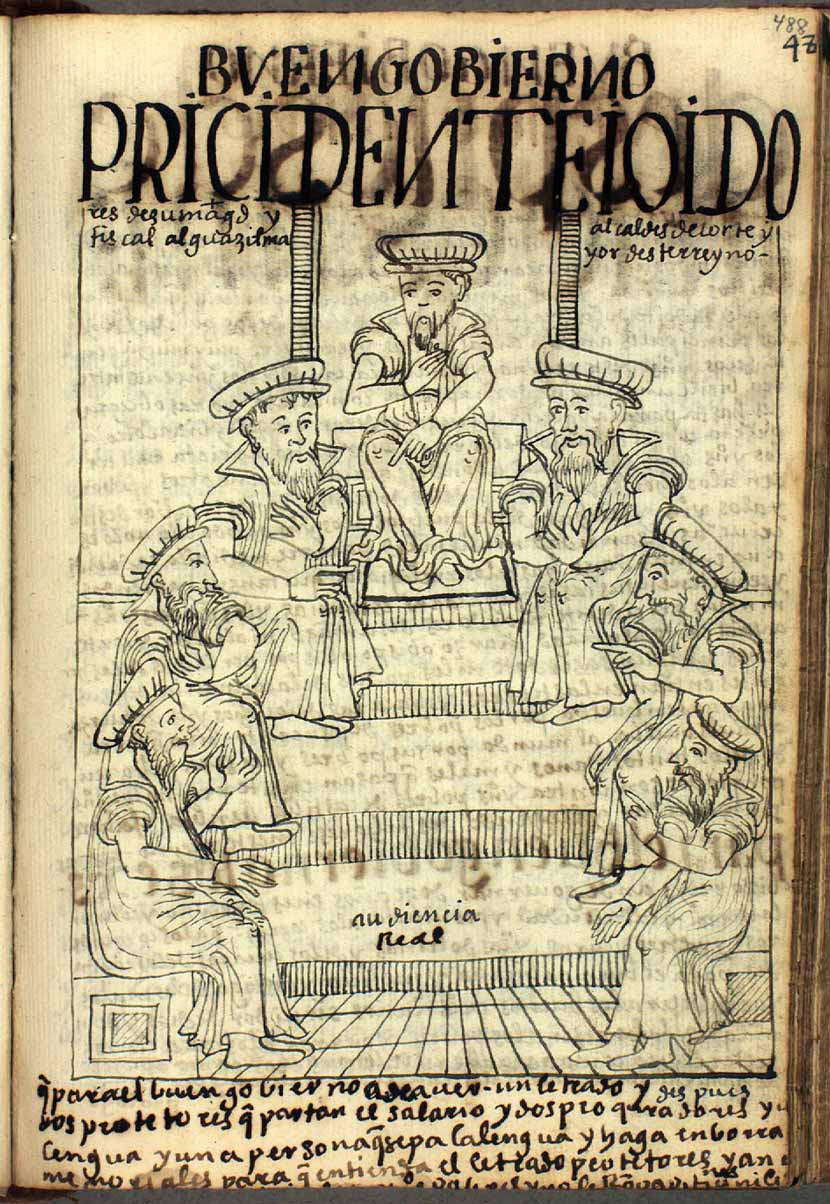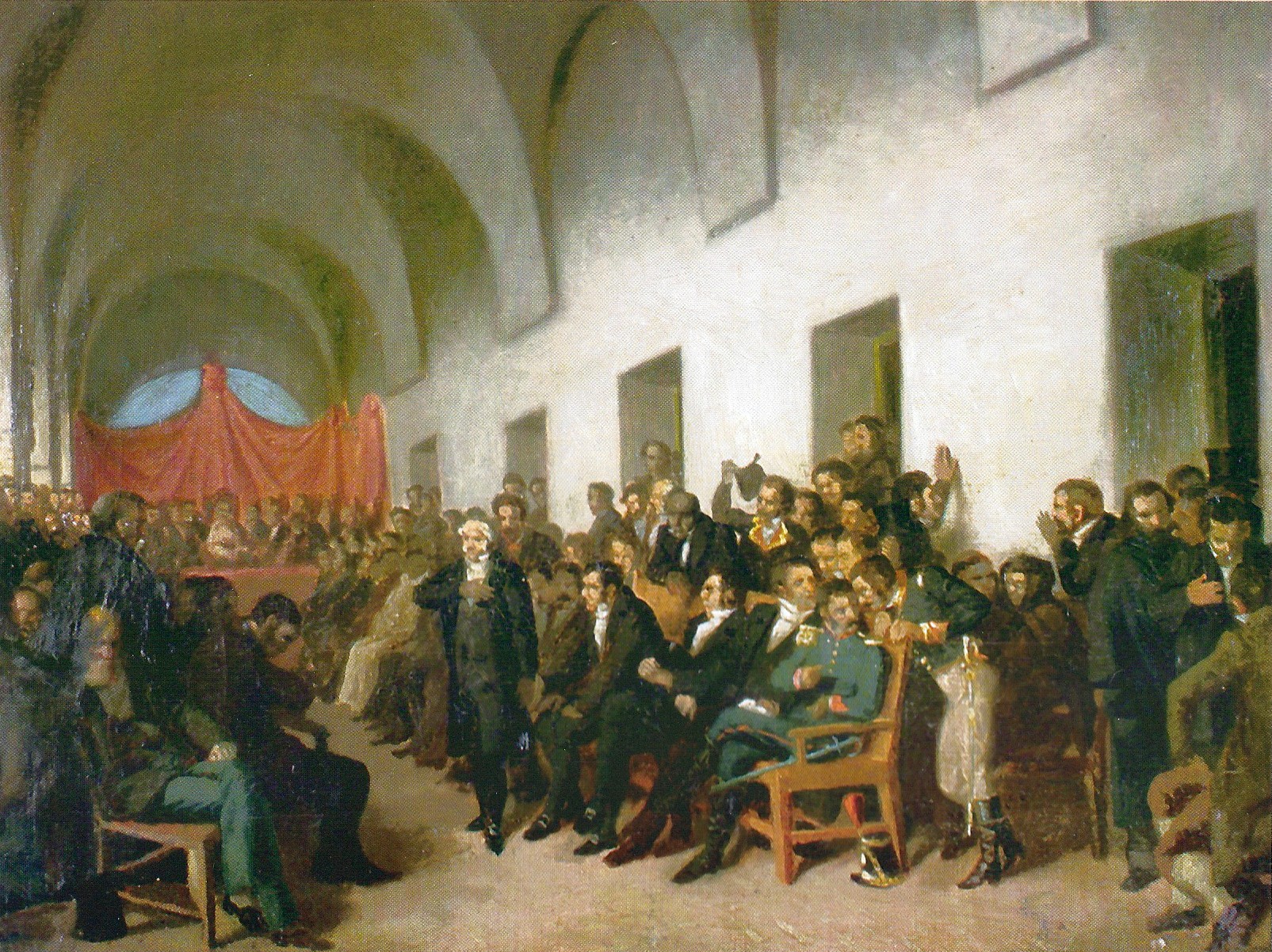|
Alcalde
''Alcalde'' (; ) is the traditional Spanish municipal magistrate, who had both judicial and Administration (government), administrative functions. An ''alcalde'' was, in the absence of a corregidor (position), corregidor, the presiding officer of the Crown of Castile, Castilian ''Cabildo (council), cabildo'' (the municipal council) and judge of first instance of a town. ''Alcaldes'' were elected annually, without the right to reelection for two or three years, by the ''regidores'' (council members) of the municipal council. The office of the ''alcalde'' was signified by a staff of office, which they were to take with them when doing their business. A woman who holds the office is termed an ''alcaldesa''. In New Spain (Mexico), ''alcaldes mayores'' were chief administrators in colonial-era administrative territories termed ''alcaldías mayores''; in colonial-era Peru the units were called ''corregimientos''. ''Alcalde'' was also a title given to Indigenous peoples of the America ... [...More Info...] [...Related Items...] OR: [Wikipedia] [Google] [Baidu] [Amazon] |
Corregidor (position)
A ''corregidor'' () was a local administrative and judicial official in the Spanish Empire. They were the representatives of the king, royal jurisdiction over a town and its district. The name comes from the word ''corregir,'' meaning "to correct". He was the highest authority of a ''corregimiento''. In the Spanish Americas and the Spanish Philippines, a ''corregidor'' was often called an ''alcalde mayor''. They began to be appointed in Pre-Spanish Imperial fourteenth century Kingdom of Castile, Castile. Development in Spain The idea of appointing Spanish Crown, Crown officials to oversee local affairs was inspired by the Roman law#In the West, late-medieval revival of Roman law. The goal was to create an administrative bureaucracy, which was uniformly trained in the Roman model. In spite of the opposition of Cabildo (council), council towns and the ''Cortes Generales#History of the Cortes, Cortes'' (Parliament), Castilian kings began to appoint direct representatives in towns ... [...More Info...] [...Related Items...] OR: [Wikipedia] [Google] [Baidu] [Amazon] |
New Spain
New Spain, officially the Viceroyalty of New Spain ( ; Nahuatl: ''Yankwik Kaxtillan Birreiyotl''), originally the Kingdom of New Spain, was an integral territorial entity of the Spanish Empire, established by Habsburg Spain. It was one of several domains established during the Spanish colonization of the Americas, Spanish conquest of the Americas, and had its capital in Mexico City. Its jurisdiction comprised a large area of the southern and western portions of North America, mainly what became Mexico and the Southwestern United States, but also California, Florida and Louisiana (New Spain), Louisiana; Central America as Mexico, the Caribbean like Hispaniola and Martinique, Martinica, and northern parts of South America, even Colombia; several Pacific archipelagos, including the Philippines and Guam. Additional Asian colonies included "Spanish Formosa", on the island of Taiwan. After the 1521 Spanish conquest of the Aztec Empire, conqueror Hernán Cortés named the territory New S ... [...More Info...] [...Related Items...] OR: [Wikipedia] [Google] [Baidu] [Amazon] |
Qadi
A qadi (; ) is the magistrate or judge of a Sharia court, who also exercises extrajudicial functions such as mediation, guardianship over orphans and minors, and supervision and auditing of public works. History The term '' was in use from the time of Muhammad during the early history of Islam, and remained the term used for judges throughout Islamic history and the period of the caliphates. While the and played the role in elucidation of the principles of Islamic jurisprudence () and the Islamic law (), the qadi remained the key person ensuring the establishment of justice on the basis of these very laws and rules. Thus, the qadi was chosen from amongst those who had mastered the sciences of jurisprudence and law. The office of qadi continued to be a very important one in every principality of the caliphates and sultanates of the various Muslim empires over the centuries. The rulers appointed a qadi in every region, town, and village for judicial and administrative cont ... [...More Info...] [...Related Items...] OR: [Wikipedia] [Google] [Baidu] [Amazon] |
Audiencia Real
A ''Real Audiencia'' (), or simply an ''Audiencia'' (), was an appellate court in Spain and its empire. The name of the institution literally translates as Royal Audience. The additional designation ''chancillería'' (or ''cancillería'', Catalan: ''cancelleria'', English: '' chancellery'') was applied to the appellate courts in early modern Spain.Elliot, ''Imperial Spain'', 86. Each ''audiencia'' had '' oidores'' (Spanish: judges, literally, "hearers"). ''Audiencias'' in Spain The first ''audiencia'' was founded in the Kingdom of Castile in 1371 at Valladolid. The Valladolid Audiencia functioned as the highest court in Castile for the next two centuries. Appeals from the Castilian ''audiencias'' could only be made to the Council of Castile after its creation in 1480. After the union of the crowns of Castile and Aragon in the Kingdom of Spain and the subsequent conquest of Granada in 1492, the ''audiencia'' was divided in two, with the Audiencia of Valladolid taking cases ori ... [...More Info...] [...Related Items...] OR: [Wikipedia] [Google] [Baidu] [Amazon] |
Cabildo (council)
A cabildo () or ayuntamiento () was a Spanish Empire, Spanish colonial and early postcolonial administrative council that governed a municipality. Cabildos were sometimes appointed, sometimes elected, but were considered to be representative of all land-owning heads of medieval household, household (''vecinos''). The colonial cabildo was essentially the same as the one that was developed in Middle Ages, medieval Crown of Castile, Castile. The word ''cabildo'' has the same Latin root (''capitulum'') as the English word wiktionary:chapter, chapter and in fact is also the Spanish word for a cathedral chapter. Historically, the term ''ayuntamiento'' was often preceded by the word ''excelentísimo'' (English language, English: "most excellent") as a style (manner of address), style of office in referring to the council. That phrase is often abbreviated ''Exc.mo Ay.to'' History The Castilian cabildo has some similarities to the ancient Roman ''municipium'' and ''civitas'', especial ... [...More Info...] [...Related Items...] OR: [Wikipedia] [Google] [Baidu] [Amazon] |
Alguacil
Alguacil (in Spanish), aguazil or guazil (in Portuguese) is the title for a number of governmental office-holders. Origin The term ''alguacil'' is derived from the Arabic term (''wazir''), meaning Vizier. The first known use of the term dates back to 1579. Historical use Constable In Nahuatl, the term ''alguacil'' is a Spanish loanword that means constable or a sub- Cabildo officer. Judge There were two types of judges named ''Alguacils'': The ''Alguaciles Mayores'' (Chief Justice) and ''Alguaciles Menores'' (Justice). The Alguacils of higher importance were the Alguaciles Mayores. These positions were held by the most prominent families, so they approximated the office of '' Regidores''. (At first they were also in charge of the local prison (jail), but this function was passed very soon to the responsibility of the '' Alcaide'' or warden.) Their function was to arrest people provided by the '' Inquisitor'' or investigators and the seizure of their property. To do this one h ... [...More Info...] [...Related Items...] OR: [Wikipedia] [Google] [Baidu] [Amazon] |
Kingdom Of Castile
The Kingdom of Castile (; : ) was a polity in the Iberian Peninsula during the Middle Ages. It traces its origins to the 9th-century County of Castile (, ), as an eastern frontier lordship of the Kingdom of León. During the 10th century, the Castilian counts increased their autonomy, but it was not until 1065 that it was separated from the Kingdom of León and became a kingdom in its own right. Between 1072 and 1157, it was again united with León, and after 1230, the union became permanent. Throughout that period, the Castilian kings made extensive conquests in southern Iberia at the expense of the Islamic principalities. The Kingdoms of Castile and of León, with their southern acquisitions, came to be known collectively as the Crown of Castile, a term that also came to encompass overseas expansion. History 9th to 11th centuries: beginnings According to the chronicles of Alfonso III of Asturias, the first reference to the name "Castile" (Castilla) can be found in a documen ... [...More Info...] [...Related Items...] OR: [Wikipedia] [Google] [Baidu] [Amazon] |
Emphatic Consonant
In Semitic linguistics, an emphatic consonant is an obstruent consonant which originally contrasted, and often still contrasts, with an analogous voiced or voiceless obstruent by means of a secondary articulation. In specific Semitic languages, the members of the emphatic series may be realized as uvularized, pharyngealized, velarized or ejective, or by plain voicing contrast; for instance, in Arabic, emphasis involves retraction of the dorsum (or root) of the tongue, which has variously been described as velarization or pharyngealization depending on where the locus of the retraction is assumed to be. The term is also used, to a lesser extent, to describe cognate series in other Afro-Asiatic languages, where they are typically realized as ejective, implosive or pharyngealized consonants. In Semitic studies, emphatic consonants are commonly transcribed using the convention of placing a dot under the closest plain consonant in the Latin alphabet. However, exceptions exist: o ... [...More Info...] [...Related Items...] OR: [Wikipedia] [Google] [Baidu] [Amazon] |
Spanish Language
Spanish () or Castilian () is a Romance languages, Romance language of the Indo-European languages, Indo-European language family that evolved from the Vulgar Latin spoken on the Iberian Peninsula of Europe. Today, it is a world language, global language with 483 million native speakers, mainly in the Americas and Spain, and about 558 million speakers total, including second-language speakers. Spanish is the official language of List of countries where Spanish is an official language, 20 countries, as well as one of the Official languages of the United Nations, six official languages of the United Nations. Spanish is the world's list of languages by number of native speakers, second-most spoken native language after Mandarin Chinese; the world's list of languages by total number of speakers, fourth-most spoken language overall after English language, English, Mandarin Chinese, and Hindustani language, Hindustani (Hindi-Urdu); and the world's most widely spoken Romance language ... [...More Info...] [...Related Items...] OR: [Wikipedia] [Google] [Baidu] [Amazon] |
Portuguese Language
Portuguese ( or ) is a Western Romance language of the Indo-European language family originating from the Iberian Peninsula of Europe. It is the official language of Angola, Brazil, Cape Verde, Guinea-Bissau, Mozambique, Portugal and São Tomé and Príncipe, and has co-official language status in East Timor, Equatorial Guinea and Macau. Portuguese-speaking people or nations are known as Lusophone (). As the result of expansion during colonial times, a cultural presence of Portuguese speakers is also found around the world. Portuguese is part of the Iberian Romance languages, Ibero-Romance group that evolved from several dialects of Vulgar Latin in the medieval Kingdom of Galicia and the County of Portugal, and has kept some Gallaecian language, Celtic phonology. With approximately 250 million native speakers and 17 million second language speakers, Portuguese has approximately 267 million total speakers. It is usually listed as the List of languages by number of native speaker ... [...More Info...] [...Related Items...] OR: [Wikipedia] [Google] [Baidu] [Amazon] |




